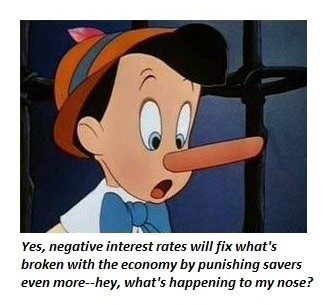The High Cost of Honesty in a Sea of Low-Cost BS
September 2, 2016
As the cost of propagating BS drops to near-zero, the value of honestly achieved analyses and conclusions rises proportionately.
Longtime correspondent Michael M. recently recommended this long-form article The Market For Lemons, The Market For Bullshit, And The Great Cascading Credence Crash Of 2016.
The article discusses the soaring market for self-serving narratives, rigged statistics like the jobs report and unemployment, and officially sanctioned PR campaigns aimed at creating approval (or passive acceptance of) a corrupt, phony status quo.
All bubbles, even the one in distributing BS, eventually pop, decimating all who relied on the bubble for their livelihood.
Michael's comments were thought-provoking:
"Honesty requires more time to analyze if bullshit is being peddled and
customized towards you (after you have honestly presented your opinion)."
"Technology is primarily being used to replicate bullshit quicker and at almost zero cost."
Michael had previously sent the following comments in response to a link in Musings 27 on honesty:
"THE ABILITY TO BE HONEST is a very good point. I understand it as having the strength
and time (!) to carry the consequences of being honest.
Being honest makes you more vulnerable, for as you become predictable, you are
easier to game and you have fewer options to respond to weird/ crazy/ offensive behavior.
You need extra time to constantly ask yourself if offers or opinions presented
to you (after you have honestly presented your opinion) are true, or marketing versions
(BS) that have been tailored for you."
The gist of the "market for BS" article is that BS is now so cheap to distribute
and so over-abundant that the "market for BS", i.e. its believability, will soon crash.
Our first reaction might be to cheer such a loss of confidence in the BS narratives that
support the status quo, but the author of the article goes to some pains to show that
widespread acceptance of BS narratives has positive attributes:
1. we all share a common ground of narratives that enable a variety of shared goals and transactions
2. these transactions are generally low-cost because the cost of challenging the narratives
has been reduced.
Put another way: a world in which BS has depreciated to zero is a world in which everything
must challenged and the cost of sorting truth and honesty from BS is permanently high.
Once faith in BS drops to zero, every opinion is equally suspect and equally "true" until
costly investigation proves otherwise.
Michael's comments invite an exploration of the high costs of honesty
in a system in which technology enables the nearly-free propagation of BS and the
nearly-free automation of BS responses to opinions that were achieved by honest
(and therefore high-cost) effort.

In this way, BS is like cheating in school:
the cost of cheating is low and the rewards if the "mark" (the teacher) accepts the BS
as real are high. In comparison, the cost of learning the material thoroughly is very
high and the rewards (a good grade) have been depreciated by BS (grade inflation to
quell student-parent complaints about low grades--everyone gets a B for showing up and
BS often earns a A).
The ability to form honestly reached conclusions is costly in terms of time and
effort, and it's "cheaper" to accept BS. As the author of the article observed, just
as Gresham's Law holds that bad money will drive out good money (as people hoard the good
money and use the bad money as quickly as possible), BS drives out honesty and honestly
reached conclusions.
Michael also points out that the cost of maintaining honesty is high, as media
and technology inundate us with BS designed to persuade everyone in our profile of
views/purchases.
What can we conclude from the high cost of honesty in a world of
nearly-free BS?
1. One way to lower the cost of maintaining honesty is reduce the inputs of BS from a
fire hose to a trickle by limiting exposure to both mass and targeted media.
2. Decentralized, distributed systems such as bitcoin enable trusted transactions
without the high costs of centralized verification, authentication, etc.
3. Dealing exclusively with honest people and truthful institutions lowers the cost
of being honest.
4. As the cost of propagating BS drops to near-zero, the value of honestly achieved
analyses and conclusions rises proportionately.
5. The ability to remain honest in a sea of BS is akin to holding gold coins in
an economy of lead coins coated with a microscopic layer of gold to appear "solid gold."
This essay was drawn from Musings Report 31. The Musings Reports are emailed weekly to
subscribers ($5/month) and major contributors ($50+ annually). If you'd like to support
this blog, please consider subscribing (links below or in the right sidebar).
My new book is #9 on Kindle short reads -> politics and social science:
Why Our Status Quo Failed and Is Beyond Reform ($3.95 Kindle ebook,
$8.95 print edition) For more, please visit the
book's website.
NOTE: Contributions/subscriptions are acknowledged in the order received. Your name and email remain confidential and will not be given to any other individual, company or agency.
|
Thank you, Eugene S.-P. ($5/month), for your monstrously generous subscription to this site-- I am greatly honored by your support and readership. |

Discover why I’m looking to retire in a SE Asia luxury resort for $1,200/month. |